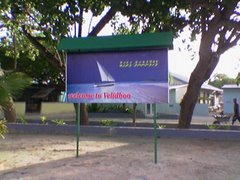Report: Soodh
 President Maumoon Abdul Gayoom has said that climate change is a real human issue that can wipe out some of the fundamental human rights. “Our challenge is to navigate the complexities of science and the rough seas of political negotiations to reach a comprehensive international consensus on global climate change”, says President Gayoom
President Maumoon Abdul Gayoom has said that climate change is a real human issue that can wipe out some of the fundamental human rights. “Our challenge is to navigate the complexities of science and the rough seas of political negotiations to reach a comprehensive international consensus on global climate change”, says President Gayoom
President Gayoom has said that climate change is a real human issue that could wipe out some fundamental human rights, including the right to life itself. The President made the remark in his address at this morning’s Opening Session of the second EU Development Days conference in Lisbon, Portugal.
“Climate change is not just an environmental problem, nor is it a scientific theory; it is first and foremost a real human issue”, the President highlighted. He warned that, if climate change was left unchecked, it could “very well wipe out some fundamental human rights we enjoy, including the right to life itself”.
In his speech, President Gayoom said that the Maldives was leading an international initiative of Small Island States to put people back at the heart of climate change policy. Announcing that the Maldives was hosting a conference entitled “The Human Dimension of Global Climate Change” in Male’, on the 13th and 14th of month, the President expressed his hope that that the conference would pave the way for Small Island States to go to Bali with a common platform and an unambiguous message.
The President said that climate change was undoubtedly the fundamental challenge facing mankind during the 21st century. He noted that that, for the Maldives, the impacts of global warming pose the most immediate and far-reaching danger to the country’s natural ecosystems.
Highlighting that it was exactly two decades ago that he first spoke at the UN General Assembly on global warming, President Gayoom vowed to continue his vigorous campaign of public diplomacy for the global recognition that every individual is entitled to the fundamental right of a safe environment.
Focusing on the agenda of discussions for the second European Development Days, President highlighted that the deliberations with developing countries on building a Global Climate Change Alliance (GCCA) symbolized the recognition of the fact that Least Developed Countries and Small Island Developing States would be hit “earliest and hardest” by climate change and resultant sea-level rise. He noted that the European Commission had already earmarked Euro 50 million to the GCCA from 2008-2010, and stressed that this announced was a testimony to the EU’s commitment towards addressing global climate change. He also commended the decision of EU heads of state and government to put forward proposals for a post-2012 climate change agreement.
President Gayoom briefed the assembly on the vulnerability of the Maldives to climate change and the rising seas, he emphasized the deep concern of his Government over the present lack of consensus on a comprehensive framework for post-Kyoto cuts in greenhouse gas emissions. He also said that the tidal surges experienced on 80 islands earlier this year were “a grim reminder of the devastating tsunami of 2004 and a clear warning of future disasters”.
Elaborating on the dangers that sea-level rise posed to the survival of the Maldives, the President said:
“All around us are the disturbing signs that, slowly but surely, the seas are encroaching and engulfing our tiny archipelago. This is why the Maldives has long championed the cause of fighting climate change.
Recalling that the Maldives was the very first signatory of the Kyoto Protocol, the President noted that his Government now intended to “be a vocal advocate for a comprehensive framework to replace the Kyoto strategy”. He added that the hope and aspiration of the Maldivian people was to develop a diversified portfolio of policies to deal with global warming. President Gayoom said that the Maldives would pursue a vigorous program of public diplomacy to continue to raise awareness on climate change, and thereby present climate change adaptation and mitigation as opportunities to embrace as well as problems to solve.
Speaking on national strategies and policies to address climate change, the President called on the international community to extend their strong support towards the rapid implementation and financing of the plans and projects identified in the Maldives’ National Adaptation Plan (NAPA).
President Gayoom said that the challenge was to navigate the complexities of science and the rough seas of political negotiation to reach a comprehensive international consensus on global climate change. He warned that on too many occasions the international community had failed to reach consensus, because it had let short-term profits dictate over long-term global benefits. In conclusion, the President said, “Let us try to put a smile on the faces of our peoples. We owe it to them!”
President’s address was preceded by addresses by the Prime Minister of Portugal, His Excellency Mr. Jose Socrates and the President of the European Commission, His Excellency Mr. Jose Manuel Barroso.
Among the delegates listening to the President’s address was the former Secretary General of the United Nations, His Excellency Mr. Kofi Annan. The President’s address was warmly applauded by the gathering of EU officials, European Parliamentarians, environmental activists and policymakers and NGO officials from around the world.


No comments:
Post a Comment